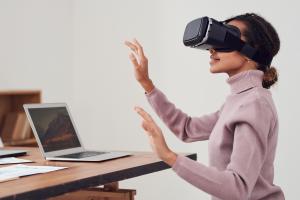
Virtual Reality is being used to help challenge stereotypes and reduce sectarian prejudice in a project developed through Queen’s University Belfast with assistance from the Community Relations Council (CRC).
Dr Salvador Alvidrez, principal investigator for the project, joined CRC for a research secondment during 2019.
Virtual reality (VR) is an emergent technology that is currently being applied to many areas such as business, health care and entertainment. It has become more affordable and popular in recent years.
“Our project will test social interactions in VR between members of the Catholic and Protestant communities in Northern Ireland and their influence in overcoming prejudiced perceptions,” Salvador explained.
Salvador is from Mexico and completed his PhD in Spain, focusing on using communication technologies to reduce prejudice towards ethnic minorities.
“I carried out a similar study at the University of California Davis using VR and the findings were quite promising,” Salvador explained. “My current project was awarded a Marie Curie Fellowship, giving me the opportunity of working with Professor Rhiannon Turner at Queen’s University Belfast.”
“The reason behind this approach was to find out first-hand what is the state of current relationships between communities, and what position sectarianism occupies among people’s current concerns,” Salvador said.
The second stage will involve setting the virtual reality interactions.
“VR offers a risk-free space to talk and discuss issues that would otherwise be difficult on a face-to-face basis,” Salvador began. “As you are using an avatar, you remain “anonymous” but visible at the same time. VR can be a stage in which animosity can be alleviated before getting people to meet face-to-face.”
It was important for Salvador to develop this project in Northern Ireland.
“While I was collecting information from community members, I noticed that not only the people who lived during The Troubles consider that sectarianism is still present and alive in Northern Ireland, but this opinion is also shared by young university students,” he said. “This says a lot about the current state of relations between communities.”
However, respondents also expressed a strong interest and willingness to overcome these differences with bottom-up solutions.
“They trust in community work for addressing social problems,” he continued, “and this is where our project can become a tool for peace building.”
Digital and immersive communication tools can also be effective at bringing people together.
“The current Covid-19 pandemic has pushed a digital transformation that has not been seen before,” Salvador replied. “We rely now more than ever on digital technologies, particularly communication technologies for staying connected with our loved ones, our work colleagues, and the world outside. Every day we learn from the new communities that have been created since most lockdowns started. This shows us that communication technologies can bring people together.”
Salvador believes the project would not have been possible without the support of CRC.
“CRC helped me to get in touch with community organisations, practitioners, and contract holders that provided me not only with valuable information about the conflict but also about successful practices to bring communities closer.
“Collaborating with the CRC has shaped the project significantly by learning from its target population, thus giving us the opportunity to refine it in order to maximise its social impact.”
Further Information
Currently the VR project is still in development. Read more about the VR project at Queen’s University Belfast